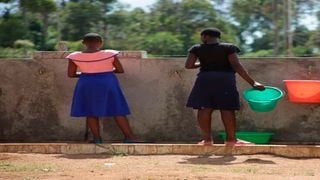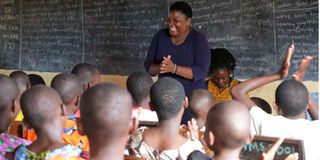
Girls at a temporary anti-FGM rescue centre in Kuria west, Migori County on December 22, 2021.
| Ondari Ogega | Nation Media GroupFGM: ‘Season of blood’ in Kuria, West Pokot
Fresh blood splattered on the tarmac and a jubilant crowd dancing to traditional tunes greets one as they make their way on the busy Migori-Isebania highway.
The mood is euphoric.
A group of boys, all of them wrapped in kangas, their faces decorated in white and ochre, are lined by the road in a procession. They have just been circumcised, fresh blood freely dripping to the ground.
The boys, in their dozens, are showered with money, as older men, carrying spears and other weapons chant merrily to renditions of the Kuria traditional songs.
This is the Bugumbe clan of the Kuria tribe. Its members are deep in the circumcision season for the boys, a traditional rite of passage that will see the candidates graduate from boys to men.
Suddenly, motorbikes appear with young girls aboard. They have secretly been circumcised and are hastily being taken to their homes where parties will be held.
They are all covered in kangas and are supported on the motorbikes, which move slowly, the riders careful not to inflict more pain to the girls.
“Theirs is done in secrecy to beat the police dragnet. The government is hard on us, so we do not parade them alongside the boys as was the case before. Their cut is often conducted in the wee hours of the morning in the hills away from the prying eyes of the public,” says Mzee Rioba Chacha, an elder.
Targets young girls
The cut, or Female Genital Mutilation (FGM), according to Mzee Chacha, is now targeting girls as young as five, after the government launched a crackdown in efforts to stop the cultural practice.
“It is being coordinated through phone calls. The circumcisers are often called by the victim’s parents and the act is done hastily since police and activists are always on the prowl,” he explains.
Just like for the boys, the cut ushers the girls into womanhood. Unfortunately, this opens the door to child marriages, and often the girls do not complete their education.
For this reason, from October 2011, the practice has been banned in Kenya.
Young girls who have been rescued from the act are currently sheltered in makeshift rescue centres spread across the region.
*Mary Boke (not her real name) and her mother moved to one of the camps in Kuria West after learning of her father’s intention to have her circumcised.
“My mother accompanied me to the camp after learning that my dad was hell-bent on having me undergo the cut. He has since been threatening us with dire consequences should we go back home while threatening to divorce my mum,” the 12-year-old said when Nation visited the centre.
She is, however, worried that her education might come to an abrupt end after her father allegedly disowned her for refusing to undergo the cut.
"I am worried that my father no longer wants to associate with me if I do not accept to take the cut. I am preparing to sit the Kenya Certificate of Primary Education (KCPE) exam but if I go home, I will be subjected to circumcision," she said.

Geceso Women Network Director Susan Matinde speaks to Girls at a temporary anti-FGM rescue centre in Kuria West, Migori County, on December 22, 2021.
A majority of the 126 girls at the rescue centre are in primary school, with only a few in secondary school.
Mrs Suzanne Matinde, the programmes coordinator at Gesose, a non-profit organisation currently protecting the girls, decried poor sanitation and lack of food to sustain the rising number.
Ms Matinde noted that even though some parents had committed to have their children back promising not to subject them to the agonising ritual, repatriating the uncut girls “was proving tricky as the community was in the peak of FGM season”.
Mrs Mary Wegesa, another activist taking care of the girls, said the institution was getting overwhelmed, with more girls expected to join the camp as the circumcision season approaches a climax.
“We lack basic sanitary materials as well as food to cater for the fast rising population. The survivors are relying on food rations from the school following the end term break. Their security is equally at risk,” she said when the Nation visited the centre.
Politicians to blame?
Law enforcers in Kuria West and children's officers have blamed the rising cases of FGM to lack of political goodwill in taming the vice. By Thursday, 165 girls had been rescued by anti FGM crusades amidst calls for material support in the already overstretched facilities.
Kuria West Sub County Police Commander Cletti Kimaiyo blamed the area politicians of secretly funding the perpetrators “while keeping a deaf eye on the plight of the victims.
“Being a campaign season, politicians are shying off from addressing the FGM, issue out of fear of losing support from the community who deeply cherish the practice,” he said.
The police boss accused area administrators of colluding with the perpetrators to abet the vice while promising punitive measures against the said officers.
“We profiled two government officers who are working with the perpetrators. The matter is under investigation and we will soon be issuing interdiction letters towards the same,” he said.
It is the same case in West Pokot County, where anti-FGM organisations have raised concern over the rise in FGM cases, with more than 75 per cent of girls at risk this festive season.
The practice is rampant in marginalised areas of Kanyerus, Masol, Muino, Kapsolion, Takaywa, Nyangaita, Nyarkulian, Sondany and Koporo.
Irep Programme manager Domitila Chesang said girls in the region who are now grouping themselves together and looking for circumcisers without knowledge of their parents. She cited local politicians as an impediment to the fight against the vice.
“We have been using chiefs and village elders, CBOS and teachers who have been instrumental in the fight and we have realised fruits. We want leaders to intervene because they are role models. We have tried to ensure that we reach remote areas where the problem is. We need collective responsibility,” she said.
“We have trained Nyumba Kumi people, women and men and youths. Youths should understand and accept to marry the uncircumcised girls because they are also affected in marriages,” she said.
Ms Chesang also faulted men in the community, saying they were custodians of bad culture and traditions.
World Vision Project officer for Girl Child Promotion Project in the County Teresa Cheptoo said many girls lacked knowledge on the effects of FGM,” said Ms Cheptoo.
She pointed out that the organisation had put in place measures to eradicate the vice in the area by reaching remote villages.
“We have tried to ensure that we reach remote areas where the problem is and not sit in conferences in big hotels in Kitale and Nairobi. We have convinced lobby groups and stakeholders so that we collaborate in fighting the vices by addressing directly the affected people,” she said.






